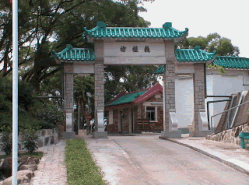|
Lantau -
Hei Ling Chau - Super
Prison
The Government
is forging ahead.
Inside
the consultation process:
Here are
summaries of what when on during "consultation"
with SOS and othe green groups Jun 23-24, 2004.
SOS summary
SOS Q&A
Summary
by Save Lamma and other groups
Despite
public objections, LegCo approved the money for a feasibility
study. A public consultation started Dec 8, 2003. SOS has
given our views, but one voice is not enough. The more objections
they receive, the more likely the project will get another
very serious review.
http://www.ced.gov.hk/eng/projects/hlcfs/hlcfs.htm#d
Send in
your views now!
26
Jan, 2004
An
email to SOS from the community:
The 22.6
Sq Km of HK's land area (ie 2%) [ that is designated PLA ]
Firing Range, should have been returned by the military to
the HK Government - ie the people of HK.
This should have been done ten years before 1997, and the
UK should have sent in their Sappers to clean out any dangerous
or unexploded ordnance that remains there.
Now the PLA have it. They have millions of sq. kilometres
in the rest of the PRC to play with their guns!
This area should be cleaned up - the HK Govt. could pay for
the PLA sappers to do the job - and this land could then be
put to good use. If we do need a Super Prison - build it there
!
Yes SOS - use the useless hinterland !
Copyright © 2003. South China Morning Post Publishers
Ltd. All rights reserved.
 Tuesday May 20 2003
Tuesday May 20 2003
Superjail is doomed by lack of options, security
chiefs are told
by Stella Lee
An environmental planning expert says the choice of Hei Ling
Chau for the complex suffers a fundamental flaw
Security officials are being warned that the controversial
$12 billion superjail proposal might fail to obtain environmental
and community approval because of a fundamental planning flaw.
The warning came after last Friday's decision by legislators
to split the funding for the feasibility study into building
the prison on Hei Ling Chau.
It has been 29 months since the project was first raised
in Legco. The prolonged debate had dwelt mainly on the security
aspects of the radical shake-up of the prison system. But
the issue has shifted recently when green groups strongly
protested against the plan to put the jail complex on Hei
Ling Chau, off Lantau.
Ng Cho-nam, who teaches environmental impact assessment at
the University of Hong Kong's Geography Department, said the
government could have avoided the debate with green groups
had it thoroughly considered the environmental issues in the
early stages of site selection.
'The problem now is that the government does not have any
statistics to convince us that Hei Ling Chau is the best choice
from an environmental point of view,' he said.
According to Professor Ng, environmental impact assessment
laws require a project proponent to study and compare the
environmental impact of the project on different sites. He
said the $7 million preliminary feasibility study Legco approved
for the jail proposal last week should include such a comparative
study. Otherwise, the government risked repeating the Long
Valley debacle.
In 1999, the KCRC unveiled plans to build its Lok Ma Chau
line across Long Valley's wetlands. But this was dropped after
it failed to win government approval on environmental grounds.
It now plans to build a 7km rail tunnel in the valley.
Hei Ling Chau and Kong Nga Po, near the border, were shortlisted
for the superjail project by the government in 2001 because
they were large enough, developable and met a list of nine
criteria.
In comparing the two sites, officials look into their operational
effectiveness, planning, environment and other considerations.
The Security Bureau only pointed out briefly in a document
presented to legislators in June 2001 that Hei Ling Chau and
Sunshine Island were proposed for conservation in an official
study due to the islands' ecologically important habitats
and valuable natural landscape. It said reclamation might
compromise the conservation.
In July last year, Hei Ling Chau was picked as the government
said the island had 'less potential for alternative development
in the long run from an overall planning point of view' than
Kong Nga Po, which is one of the areas covered in the 'Hong
Kong 2030' planning study.
But a bridge needed to be built between Hei Ling Chau and
Lantau for operational and emergency reasons, while reclamation
was necessary for the prison site.
The location of the proposed prison hardly figured in the
debates of the Legco's security panel when it took up the
proposal.
Instead, legislators were more concerned about whether the
scale of the project would pose security and management problems
in future.
The government later backed down, cutting by half its original
proposal to build a $28 billion, 120-hectare jail for 15,000
inmates.
The scaled-down proposal will provide 7,220 places and bring
the total Hong Kong prison capacity to 13,860. It will replace
eight of the existing 24 prisons, putting real estate worth
billions of dollars on to the market.
The chairman of Legco's security panel, Lau Kong-wah, said
he did not anticipate environmental concerns to pose a big
problem to the construction of the superjail.
'The green groups usually have many opinions on many development
projects. But we must adopt a practical approach. We respect
their views, but we have to balance other concerns like security
and cost-effectiveness,' Mr Lau said.
If the project is given the green light, construction is
expected to start in 2006 and be completed in 2012.
The government said the complex would ease the overcrowding
at Hong Kong's prisons.
The sheer size of the superjail would also ensure a significant
economy of scale, allowing the government to cut operational
and manpower costs.
Links
World
Wildlife Fund
PRISON DEVELOPMENT PLAN AT HEI
LING CHAU
LegCo
Prison Development at Hei Ling Chau (pdf)
|


